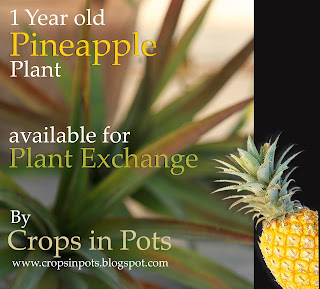Plant exchange is a brilliant practice that lets us swap plants from our gardens.
 |
| My first home-grown pineapple! |
2 years back, a friend gave me a Pineapple plant that was 1 year old. Last year it produced the most delicious Pineapple I have ever tasted and later it left me with 4 baby plants.
I am keeping 3 for my own garden. 1 of these plants can be yours if you have a special plant to make a trade :)
So hurry up! Post a photo of your plant on Crops in Pots that you wish to swap for my pineapple plant or email me at crops.in.pots@gmail.com
Note: Pineapples loves to grow in containers but will take up some space. They fruit when they are 2 years old and after fruiting they will leave 3-4 new plants for you.
* this offer is only for Karachi.



